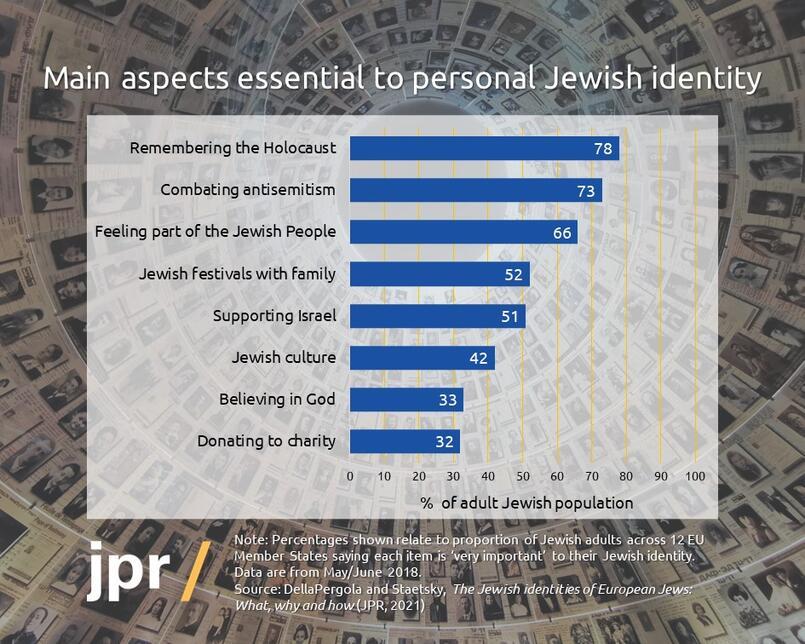Remembering the Holocaust and combating antisemitism are among the most important elements of Jewish identity today
Dr Jonathan Boyd
Dr Jonathan Boyd
It was 79 years ago this month that Mordecai Anielewicz, the leader of the Warsaw Ghetto Uprising, committed suicide at 18 Mila Street in Warsaw. The Nazis were systematically burning the ghetto to the ground, and after three weeks of fighting, he was left with no other option.
But it was just five years later, 74 years ago this month, that David Ben-Gurion stood in the Tel Aviv Museum at 16 Rothschild Boulevard, and read Israel’s Declaration of Independence, before handing over to Rabbi Yehuda Leib Fishman to recite the shehecheyanu.
Two of the most extraordinary events in all of Jewish history – the Holocaust and the establishment of the State of Israel – happened almost within the blink of an eye. Historians have long debated the connections between the two – whether Israel would have been established had the Holocaust not occurred, and whether the Holocaust could have possibly happened had Israel already existed.
We can never know, but it’s striking to note that, as with their close proximity in history, so their close proximity in the annual Jewish calendar. The days marking both episodes are separated by just one week, with Yom HaShoah falling a week before Yom Ha’Atzmaut, as well as a week after the last day of Pesach. The debate in the fledgling State of Israel over when to commemorate the Shoah was robust and fraught, and the selected day was ultimately something of a fudge – a compromise between the surviving ghetto fighters and the religious establishment which, despite satisfying neither party, contained within it a certain poetry.
In the Jewish calendar, the Shoah is commemorated on a day equidistant between the two great redemptive moments in Jewish history – freedom from Egyptian oppression, and freedom to be an independent modern nation. Pesach and Yom Ha’Atzmaut sandwich Yom HaShoah, as if to say our past is so much more than our oppression, and our future will be too. Despite the terrible suffering we have experienced, there is something much deeper in our history and tradition that should inspire us to see who we truly are and who we can become.
But it seems that message has not been fully absorbed. When our research team at the Institute for Jewish Policy Research recently asked Jews across Europe which aspects of Jewishness were most important to them, ‘remembering the Holocaust’ and ‘combating antisemitism’ significantly outscored everything else, including ‘supporting Israel,’ ‘believing in God,’ ‘donating to charity,’ even ‘sharing Jewish festivals with family.’ It seems that, as a people, we are far more likely to find meaning in the threats posed by our enemies, and the memories of those threats, than we are in anything else, including the establishment and continued existence of the first independent Jewish State for two millennia.

Some may argue this is because antisemitism is becoming potent again – that we need to remind others about where antisemitism can lead and rally together to fight it. I don’t minimise the threats for a moment. Yet looking at the situation in the UK, I wouldn’t overstate them either. Data consistently show that levels of antisemitism in the country are among the lowest in the world. Levels of Jewish migration from the UK – an important indicator of antisemitism – have remained largely steady for years. And whilst the numbers of incidents being reported has climbed in recent years, the proportion of British Jews affected remains very small.
It is much easier to be influenced by stories of harassment, discrimination, vandalism and violence - historical and contemporary - than by data. But much of the data on antisemitism offers an important perspective. We need to be vigilant, certainly. But we don’t need to be defined by hatred. We can, and should, focus far more on the richness of our culture and sense of purpose than obsess over the bigots who wish us ill. Indeed, if the Jewish People is to thrive rather than simply survive, we need to do just that.
Executive Director
Executive Director
Jonathan has been Executive Director of JPR since 2010, having previously held research and policy positions at the JDC International Centre for Community Development in...
Read more